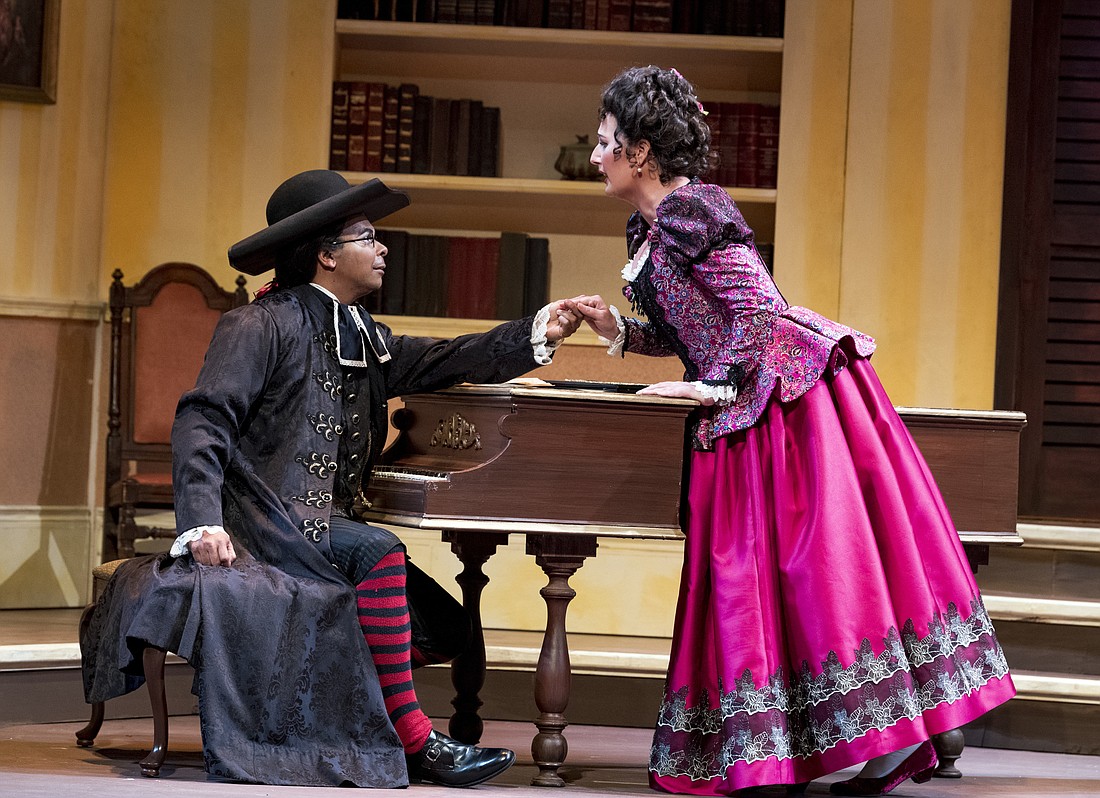- January 14, 2025
-
-
Loading

Loading

Rossini always grumbled that of his 37 operas, he would only be remembered for “The Barber of Seville.”
While it’s true several of his other operas are certainly in the repertoire, his setting of Sterbini’s libretto based on the Beaumarchais play certainly makes “The Barber of Seville” his most performed work.
The dramatic ploy of using cleverness and a little deceit to free a young ward from the romantic desires of an aging guardian so she may find true love and happiness is one that has been pretty much overused in just about every format possible. But it still seems to work.
And work it did when the Sarasota Opera opened its 2018 Fall Season with a rousing revival Oct. 26 of its 2008 production of “The Barber” with a cast of familiar singers.
New to the company was the Count Almaviva of Victor Ryan Robertson, who, in a series of disguises, finally succeeds in freeing Rosina from her elderly guardian, Dr. Bartolo. Robertson’s lyric tenor is at once clear and flexible, if a bit small scaled, and both acting and voice increased in ardor and verve throughout the evening.
Filippo Fontana, who was seen in last season’s “Manon Lescaut,” returned as Figaro, and in spite of a reported twisted knee, gave us a most active, conniving and well-sung Figaro. His voice is both a bit lighter and brighter in timbre than we usually hear in the role, but has a twist at times that would lead us to believe he also had a bit of a grudge to settle with Dr. Bartolo.
Stefano De Peppo returned as the overbearing, possessive and — in his own mind at least — mistreated Don Bartolo. His characterization has both sharpened and deepened since his last appearance in this role, adding many subtleties that are only honed by experience. Both Fontana and De Peppo had the luxury of singing in their native Italian, which gave them extra nuance and velocity when needed, especially in the patter sections of their arias.
Long a stalwart member of the Sarasota Opera, bass Young Bok Kim has sung a kaleidoscope of roles during his tenure, and his singing and portrayal of the cleric and singing teacher Don Basilio continues to grow and improve vocally. His double takes and sly antics only added to the “commedia dell’arte” feeling of the evening.
By far the most impressive singing of the evening came from Lisa Chavez, who enchanted everyone as last season’s Carmen. Rossini originally wrote the role of Rosina for a contralto, but it is usually sung by mezzo-sopranos or sopranos who transpose quite a bit of the music and ornamentation to a higher key.
Chavez has a lovely voice that could best be described as “mezzo-contralto," because she certainly has a solid upper register as well as a luscious lower voice. In describing her sound, “honeyed chocolate” is about as close as one can get, and yet she navigates the coloratura with apparent ease. Her Rosina was at once shy, flirtatious and scheming as she sometimes outwitted even Figaro himself.
The small but vital role of Berta, Dr. Bartolo’s housekeeper, was sung by Anna Mandina, whose aria was a delightful respite after all the antics and drama of the preceding quintet. Hers was also the lovely soprano voice that soared forth in both the finales of Acts 2 and 3.
Smaller roles were well managed by Kevin Wetzel, Samuel Schlievert and Garrett Obrycki.
In the pit was the Sarasota Orchestra, ably conducted by Artistic Director Victor De Renzi, who paced an exciting performance. Once or twice his tempi seemed a bit fast, even for this fine group of singers and players, but keep up they did.
Some listeners may have heard more ornamentation, mini-cadenzas and even appoggiaturas than one usually hears in Rossini, but such additions are certainly within the performance practices of that period and give a welcome freshness to the score, even when they surprise us. The appoggiaturas were added by De Renzi based on his own research, as were the additions to Rossini’s original ornamentation.
All of these antics and stage geography were masterfully constructed by stage director Stephanie Sundine, who handled the sometimes gnarly stage movements with seemingly great ease, while allowing the singers freedom of expression and movement.
The lovely settings of Jeffrey W. Dean, augmented by Ken Yunker’s ever-fluid lighting were accurate, well-designed and a pleasure to see. Yunker’s solo “storm scene” in Act 3 followed Rossini’s storm music perfectly.
The capacity crowd seemed attuned to every laugh, and the performers certainly earned the standing ovation they received. Although Rossini’s glass of musical champagne could use just a few more bubbles, this production of “The Barber of Seville” is an excellent opening for the 60th anniversary season of the Sarasota Opera and should not be missed.